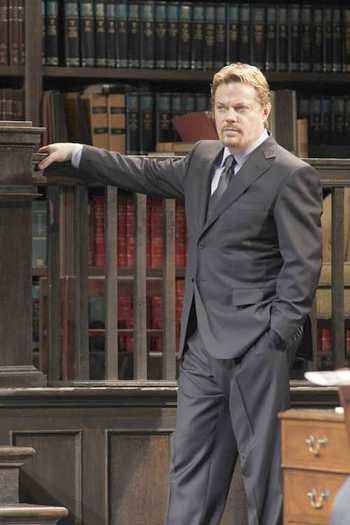SITE GUIDE
SEARCH
REVIEWS
REVIEW ARCHIVES
ADVERTISING AT CURTAINUP
FEATURES
NEWS
Etcetera and
Short Term Listings
LISTINGS
Broadway
Off-Broadway
NYC Restaurants
BOOKS and CDs
OTHER PLACES
Berkshires
London
California
New Jersey
DC
Connecticut
Philadelphia
Elsewhere
QUOTES
TKTS
PLAYWRIGHTS' ALBUMS
LETTERS TO EDITOR
FILM
LINKS
MISCELLANEOUS
Free Updates
Masthead
A CurtainUp Review
Race
|
Race Gets a New Cast
By Elizabeth Ahlfors
With its intriguing new cast, David Mamet's Race, at the Ethel Barrymore Theater, remains a riveting probe of ethics and the legal system. Richard Thomas alone continues from the original cast, portraying the client who seeks a new legal team to extricate him from a charge of raping a young African-American woman. His portrayal of the wealthy socialite, Charles Strickland, exposes an overconfident, controlled aggressive who chooses Lawson and Brown, hoping that this firm with one white and two black attorneys can turn the upcoming trial to his advantage.
The partners, Jack Lawson and Henry Brown, spend considerable time arguing if they should even take the case. It is Susan, an African-American and the youngest and newest member of the firm, who forces their decision. Lawson refers to the mechanism of coming to a decision as "entertainment". In Mametspeak, he explains, "The jury has a story. In their head. About what happened in that room. We have to drive that story out of their heads." The manipulation, while provocative and often amusing, is also grounded in morality and law. Eddie Izzard and Dennis Haysbert bring their own interpretations to Lawson and Brown. Izzard is best known as a British stand-up comic with a stream-of-consciousness monologue that ricochets from subject to subject. However, he is also appreciated as an actor (example: A Day in the Death of Joe Egg ). His portrayal of Lawson takes on the tough stance of a James Cagney thug who is nevertheless vulnerable to the turn of events and the issues of the case. Dennis Haysbert, a towering African-American with a rich imposing voice, plays Henry Brown. He is seen often on television as spokesperson for Allstate Insurance and appeared on TV's 24 as President David Palmer. Being Haysbert's Broadway debut may account for his tentative hold on the characterization of Brown at the perfomance I attended. His stage movements were often clumsy and Mamet's precise, complex cadence presented obvious challenges for Haysbert and to a lesser extent, Izzard. Yet despite his bouts of awkwardness, Haysbert's intimidating presence as the lawyer and his resonant voice offer a threatening danger to the defendant and also to his legal colleagues. It is likely that as the run continues, the talents of Haysbert and Izzard will lock into the mechanics of the play. Afton C. Williamson, understudy for Kerry Washington, the original Susan, takes the role for herself and brings to it new authority and intelligence. Her months of standing ready to fill in works to her advantage and she scores as the watchful, unexpectedly calculating newest member of the firm. Through fresh interpretations, Race remains electrifying as a smart, brisk challenge of guilt, innocence, and the social system represented in the audience. Except for the cast and schedule change below, the production notes remain as listed at the end of Elyse Sommer's original review below. Current Cast: Eddie Izzard (Jack Lawson), Dennis Haysbert (Henry Brown), Afton C. Williamson (Susan), Richard Thomas (Charles Strickland) Schedule: Tuesday at 7 pm, Wednesday through Saturday at 8 pm, Wednesday and Saturday at 2 pm, Sunday at 3 pm |
Original Review By Elyse Sommer
|
This isn't about sex,it's about Race. .— Susan What's the difference? —Jack |

James Spader
(Photo: Robert J. Saferstein) |
While Race opened officially as Christmas trees and holiday songs began to blanket Manhattan, don't look for a God Bless us all happy resolution to Mr. Mamet's Dickensian assessment of our continuing racial issues. His intent is to provoke, and so he does, with plenty of politically incorrect sexual and ethnic words to spice up the verbal dueling that's come to be known as Mamet-speak. But provocoteur though he is, David Mamet is a theater pro. He knows that people don't come to the theater for a lecture but to be entertained. As it turns out, Race is less persuasive as a powerful polemic than as an entertaining law and order style drama that happens to involve an integrated law firm in a criminal case intensified by the racial identity of the plaintiff and the defendant.
Of course the fact that Charles Strickland (Richard Thomas), who admits to having sex with his accuser but insists that it was consensual, seeks out Jack Lawson (James Spader) who's white and his partner Henry Brown (David Alan Grier), who's African-American, is no accident. Strickland thinks the firm's racial makeup would work better for him than the Jewish lawyers he's just fired. But Lawson and Brown aren't eager to take over the case since they view it as a no-win situation both in terms of getting Strickland off (which seems impossible) and the effect on their reputation if they could (being branded as racists who helped a white man to destroy a black woman).
The only possibility for winning this particular case hinges on the little sequined dress pictured on the Playbill's cover. I would be a spoiler to go into more detail. But I can tell you that Mamet is fortunate in having James Spader (an experienced lawyer via his Emmy winning Boston Legal) and David Alan Grier to play his legal eagles. They handle the take no prisoners interchanges naturally but with plenty of snap, crackle and pop. Kerry Washington as Susan, does well by the young associate who, like the female character in Speed-the-Plow, turns out to contribute a lot more to the plot complications than looking terrific. Richard Thomas rounds out the cast as the man who may or may not be guilty. Though he has the least stage time, he is extremely persuasive with wonderfully expressive body language (firm and straightbacked at first, more discombobulated as the plot thickens.
Mamet, who also directs, keeps things moving briskly even without the action and scenery shifts of TV dramas of this ilk. Santo Loquasto's handsome set combining office, conference room and law library is spacious enough so that you don't miss the TV format of lawyers and clients constantly walking and talking their way down hallways and up and down courtroom steps.
Despite the abundance of quotable comments on the race issue and the thought provoking detours into the guilt and shame that comes with conscious and subconscious prejudice, even the excellent Spader and Grier can't keep this debate from coming off as somewhat forced and artificial. As for the entertaining twists and turns of the story line, I wouldn't expect Mr. Mamet to have a cheery Christmas sort of ending, but bah humbug, I couldn't help wishing the surprise ending had come as more of a surprise.
For more about David Mamet, with links to other plays by him reviewed at Curtainup, see our David Mamet Backgrounder
| Race Written and directed by David Mamet Cast: James Spader (Jack Lawson), David Alan Grier (Henry Brown), Kerry Washington (Susan), Richard Thomas (Charles Strickland) Scenic design by Santo Loquasto Costume design by Tom Broecker Lighting design by Brian MacDevitt Stage manager: Matthew Silver Running Time: 1 hour 40 minutes, including one intermission Barrymore Theatre, 243 West 47th Street between Broadway and 8th Avenue 212/239-6200 Tuesday at 7 pm, Wednesday through Saturday at 8 pm, Wednesday and Saturday at 2 pm, Sunday at 3 pm From 11/16/09; opening 12/06/09; closing 8/23/10. Ticket: $9.50 to $121.50, Wednesday matinees $176.50 Reviewed by Elyse Sommer based on December 8th performance |
|
REVIEW FEEDBACK Highlight one of the responses below and click "copy" or"CTRL+C"
Paste the highlighted text into the subject line (CTRL+ V): Feel free to add detailed comments in the body of the email. . .also the names and emails of any friends to whom you'd like us to forward a copy of this review. You can also contact us at Curtainup at Facebook , Curtainup at Twitter and at our Blog Annex |
|
Subscribe to our FREE email updates with a note from editor Elyse Sommer about additions to the website -- with main page hot links to the latest features posted at our numerous locations. To subscribe,
E-mail: esommer@curtainup.comesommer@curtainup.com
put SUBSCRIBE CURTAINUP EMAIL UPDATE in the subject line and your full name and email address in the body of the message -- if you can spare a minute, tell us how you came to CurtainUp and from what part of the country. |







